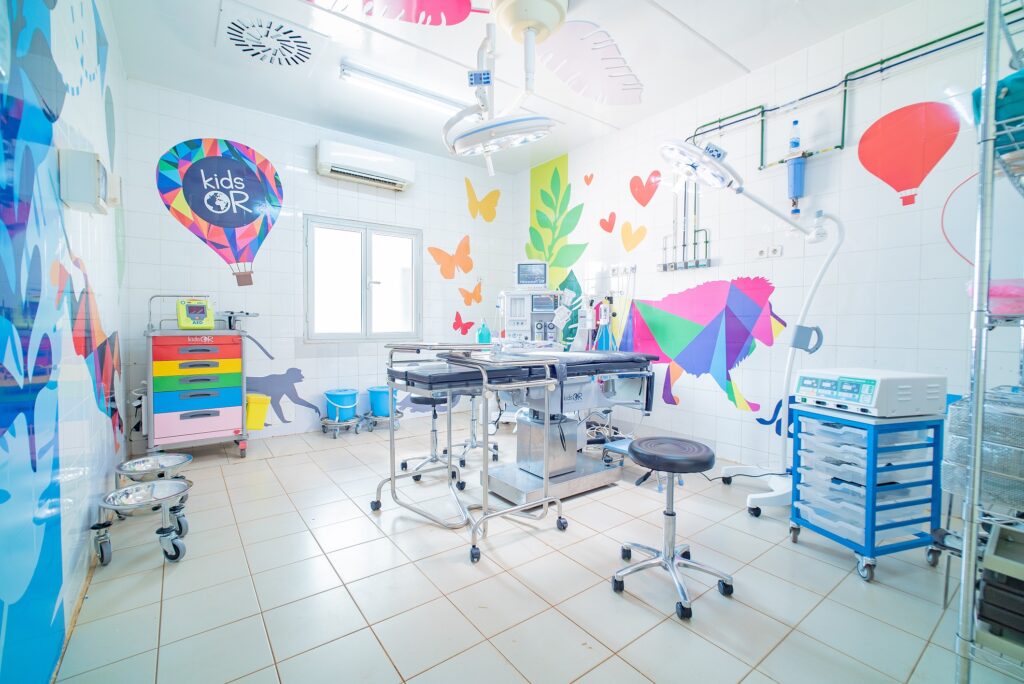AN ESTIMATED 6,000 children a month are likely to have died due to the impact on health systems in poorer countries during the Coronavirus pandemic, a new study has found.
Research commissioned by Scottish charity KidsOR and the University of California looked at the volume of paediatric surgery at hospitals in Low and Middle-Income Countries (LMIC) to understand the impact of Covid-19.
Launched by husband-and-wife philanthropists Garreth and Nicola Wood, KidsOR works to improve children’s access to surgery and has so far installed 50 paediatric Operating Rooms across Africa and aims to more than double those facilities to 120 by 2030.
The report said the impact on surgery due to Covid-19 is underreported and poorly characterised, but with children making up about half of the population in LMIC, it has been estimated that at least 6,000 children likely died every month during the pandemic due to the collateral effects on health systems.

The study found significant changes in the demographic and clinical characteristics of patients operated on pre and post-Covid – with more healthier and wealthier patients treated – raising concerns about hidden morbidity and mortality amongst poorer people.
Fewer adolescents sought surgical help, possibly due to lockdown policies resulting in a reduction in road traffic injuries, which is a major contributor of surgical morbidity and death in this age group in LMIC.
The study also found the median family income of patients treated was $600 higher during the pandemic, suggesting that poorer patients were less likely to seek care during that period.
The median age of patients has decreased by 0.6 years with more neonates and fewer adolescents presenting during the pandemic – possibly due to neonates already being present in hospitals following birth and neonatal care being prioritised.
Data suggested that patients presenting during the pandemic were healthier, with lower ASA class (the system used to assess patient fitness before surgery), and experienced better outcomes.
There was a 50% reduction in post-operative sepsis, surgical site infection, mortality, and reductions in the rate of re-operation and length of stay.
KidsOR Chief Executive Officer, David Cunningham, said: “The study suggests the improvements likely reflect a change in the patient population where sicker patients may not be getting the required care due to increased barriers to access healthcare during the pandemic.

“Our findings add to the growing evidence of hidden morbidity and excess mortality during the pandemic from patients delaying care and potentially dying at home, especially in rural and underserved areas.”
There were sharp declines of surgical volume in the month following the pandemic outbreak (March-April 2020) which contrasted with the steady rise in the total number of operations at all sites during the pre-Covid period, which could be due to KidsOR’s efforts to increase surgical capacity by providing dedicated surgical rooms or specialised equipment.
Also, overall surgical volume has been slow to recover and the total number of surgeries has not rebounded back to pre-Covid volume more than a year after the pandemic started.
The report noted that while greater human and physical resources in Higher Income Countries allow for healthcare systems to manage Covid-19 surges, healthcare systems in LMIC have been overwhelmed and worsened by inequities in resources such as PPE and vaccines.
David Cunningham added: “These findings may be consistent with those in other studies where hospitals worldwide experienced decreases in emergent surgeries during the pandemic.
“Again, we believe this may be due to sicker patients avoiding medical care or facing unsurmountable challenges in accessing care during the pandemic, but more research is needed.
“The findings of our study are particularly concerning as many LMIC have reported surges of Covid cases in recent months.
“The lack of easily accessible data in LMIC has made it difficult to assess the true impact of Covid-19 and track trends.
“These factors all combine to not only prolong the reduction in surgical capacity in LMIC, but also make it difficult to coordinate and plan recovery strategies.”
The report calls for innovative strategies to mitigate the impact of Covid, and on a community level outreach programmes to increase access to healthcare providers, or transportation policies designed for patients with acute medical needs to help address hidden morbidity.
It says that while “telehealth” has been widely used in HIC during the pandemic, that has not been the case in LMIC and wider utilisation could increase healthcare access.
David Cunningham said the report concludes that the decrease in surgical volume, without evidence of sustained recovery across multiple LMIC hospitals, demonstrates the persistent effects of the pandemic and is evidence that collateral damage on health services had been extended to children’s surgery.
He added: “Healthier and wealthier patients undergoing surgery with improved outcomes post-pandemic also raise concerns about hidden morbidity and mortality at the population level, especially among those with less resources.
“Overall, these findings call for a renewed commitment to equity, global partnerships, and innovative resource mobilisation to mitigate the pandemic’s impact on surgical services for children now and for future public health crisis.”
- The paediatric surgical data, in which 6,078 operations were assessed, was collected from hospitals in Burkina Faso, Ecuador, Nigeria and Zambia. From March to April 2020, the total surgical volume dropped by 32% (110 cases). Patients during the pandemic were younger (2.7 v 3.3 years) and healthier (ASA 1 69% v 66%), while rates of post-operative sepsis dropped to 0.3% from 1.5%; surgical infections decreased from 5.8% to 1.3%; and mortality dropped from 3.1% to 1.6%.
- The study (Impact of the COVID-19 Pandemic on Pediatric Surgical Volume in Four Low- and Middle-Income Country Hospitals: Insights from an Interrupted Time Series Analysis) has been approved by the Institution Review Boards of the University of California, San Francisco.

